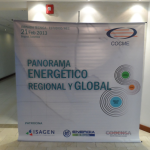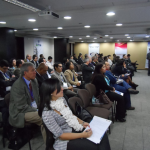
At the seminar “Regional and Global Energy Panorama” (21 February, Bogotá), José Antonio Vargas Lleras, Chair of COCME and WEC Vice-Chair for Latin America and the Caribbean (LAC), presented the 2013 World Energy Issues Monitor. For the first time, this annual study has included the profiles of select countries, including one on Colombia.
According to the study, energy subsidies and high energy prices are the top critical uncertainties issues in Colombia which are impacting on social equity and energy access.
In addition, large-scale hydro power requires further action. While Colombia has vast hydro potential, only a small proportion of this potential has been developed. In order to fully develop this resource, there must be agreement with regulators on how to minimise the environmental and social impact of dam construction, the WEC study finds.
The study also finds that the issue of smart grids remains a critical uncertainty. Colombia is currently seeking to have a regulatory framework for smart grids that encourages return on investment or provides financial support.

The Bogotá seminar also presented the findings of the Regional Energy Agenda, a study jointly conducted by a consortium of regional organisations including the WEC’s LAC members (the other partners are Olade, Aladi, Cepal, Arpel, Cier, and CAF).
The study finds that energy integration is a key instrument to ensuring energy sustainability in the region. By sharing resources across borders and creating larger market scale, countries can improve operational security, pricing, and the profitability of interconnections.
The study highlights the concerns of the countries in the Latin America and the Caribbean region, and aims to facilitate dialogue amongst governments and industry to promote sustainable energy policies to respond to regional challenges.
It analyses the regional energy framework and global economic situation, legal and institutional aspects, energy supply and demand, of energy integration, energy efficiency, social aspects such as energy access, and the environmental aspects of energy.





